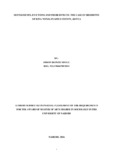| dc.description.abstract | The physical and socio-economic developments taking place in Kenya both in the pre and post devolution period are laudable. In rural areas, however these developments have displaced poor people who were eking livelihoods in trust lands. The displacement of poor people is a major concern as they fail to take cognizance of the human rights of such people and in the process result in their further impoverishment.
In Kwa Vonza/Mikuyuni sub-ward, Kitui County, in an area covering over 15,000 acres, institutional developments have displaced about 4000 persons. These displacements rendered the people landless, homeless, and jobless and dispatched them back to join the rest of the region’s Kamba people which suffer from shocking levels of poverty and lack of social facilities.
This study therefore examined the effects of the displacements and the mitigation measures taken in view of the protective guidelines stipulated by The United Nations (2007:6) and enshrined in the proposed Kenyan bill on Evictions and Settlement (2012) as well as the Kenyan Constitution on the bill of rights and land (GOK, 2010: Chapters 4 part 2(40) and 5 part 1963) which applied to all vulnerable and affected persons irrespective of whether they were holders of title to the land or not.
Literature concerning land ownership, evictions due to economic development, their impacts on those displaced was reviewed. Human rights and community based frameworks were consulted to inform the study.
Using nonprobability methods a sample of 70 household heads was drawn from the evictees of the study site. Key informants were also interviewed and case studies were conducted with some individuals who returned to their ancestral homes, those who were still in camps and/or renting facilities.
The data were analysed using frequency tables and other descriptive ways.
The study found that the evictees had not been consulted prior to evictions and that they were not given any compensation nor assistance in any way. As of the time of data collection, one third (37.2%) were still leaving in camps and rented facilities with the help of
xiii
their kinsmen. Half (57.1%) had lost permanent buildings made of baked bricks and iron sheets were. Over three quarters owned and lost livestock during the evictions. Evictees who had fruit trees were 68.6 % and a large proportion were mature income earning trees. Further, primary data from Court cases and County records showed that the evictees had at various time periods dating from the year 2003 presented their cases for arbitration and lost due to lack of appropriate legal representation. In the 2013 eviction which was the most recent, 74.3% had taken court action and the case was still going on.
Although the evictees had no legal land ownership documents, had they been given adequate technical and legal assistance as required by human rights guidelines they would have been compensated for their losses and resettled elsewhere. This act of omission amounted to violations of basic human rights..
The study recommends that a thorough social impact assessment of all accessible evictees be done to provide a framework for compensating them for their losses and restoring them to the status they had prior to evictions.
Findings revealed that although the evictees were aware of their human rights, they lacked facilitative mechanisms to pursue them aggressively. It was also found that the government and its agencies did no prepare the evictees adequately neither were measures put in place to cushion and alleviate the foreseeable sufferings of the evictees. | en_US |



